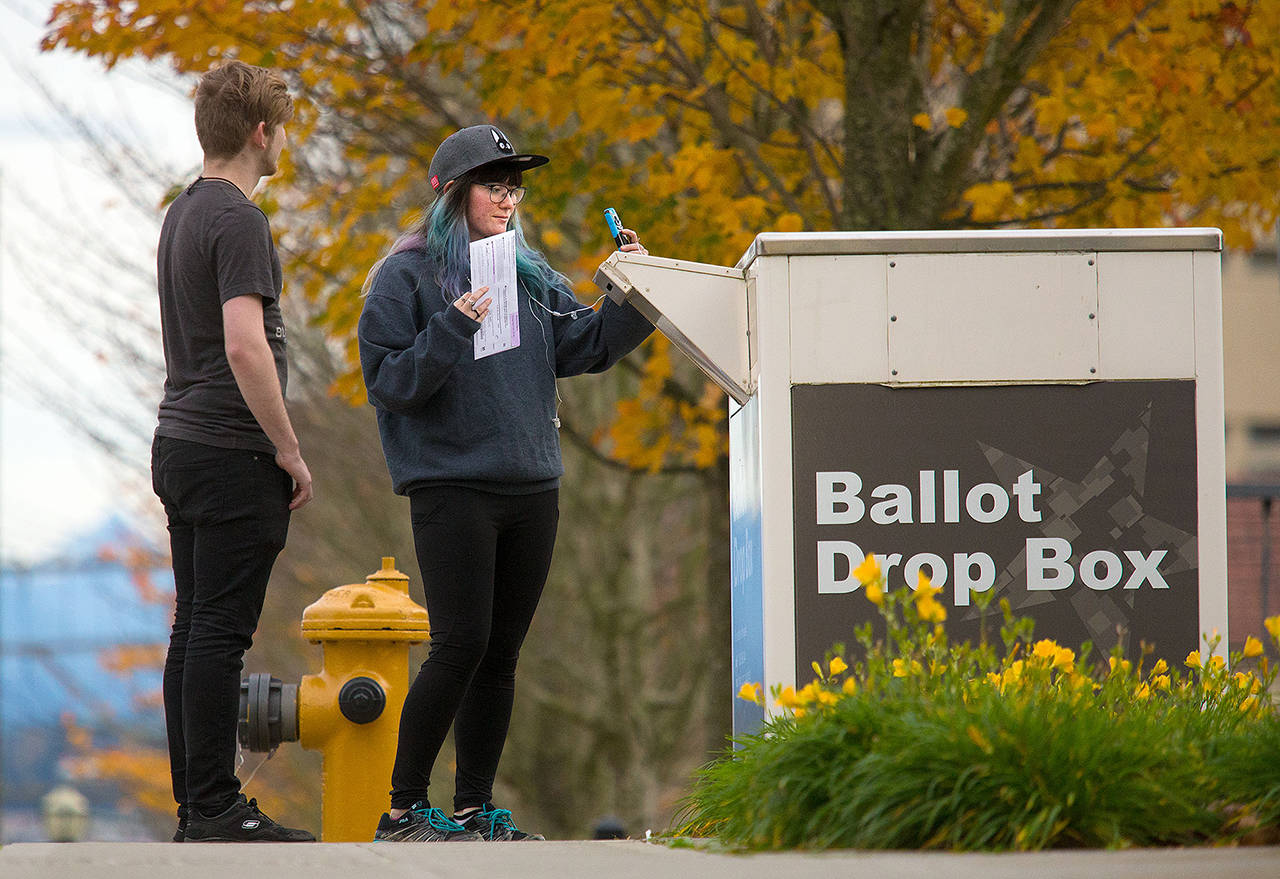OLYMPIA — There are signs adding ballot drop boxes as required under a new state law will boost voter turnout this election.
But any increase is probably not going to be spread equally across the full spectrum of voters as some supporters of the law hoped, a legislative panel learned last week.
They heard that a study conducted in King County found installing 33 more boxes there did little to incite voters who typically shun primaries and off-year elections — such as the young, the less educated, the poor and some minority groups — to change their ways.
“What we know is drop boxes are incredibly popular among voters,” Katie Baird, a University of Washington Tacoma professor, told the House Committee on State Government, Elections and Information Technology. “We found the low voting groups did not seem to be as influenced by drop boxes.”
The new law, which took effect in July, requires at least one drop box for every 15,000 registered voters in a county and a minimum of one box in each city, town, and census-designated place with a post office. Sen. Kirk Pearson, R-Monroe, sponsored the legislation which Gov. Jay Inslee signed May 16.
Baird is part of Project Vote Washington, a team of three political scientists and two economists. They studied what happened in King County in elections in 2015, when there were 10 boxes, and in 2016, when there were 43. All the elections occurred before the new law took effect.
What they discovered is the likelihood of a voter casting a ballot surged when a drop box is put in within a couple miles of their residence. When the ballots arrive, they found increased turnout only among high-propensity voters, older and white men in particular, and not those groups which traditionally don’t vote except in presidential elections.
This year the group is tracking what occurs in Pierce County. They want to do something similar in Eastern Washington as well.
After the hearing, Rep. Zack Hudgins, the committee chairman, said he knows drop boxes are popular and is glad the research team is providing some qualitative analysis on who is using them.
Most voters use a drop box to get their ballot back in.
In the 2016 presidential election, 57.5 percent of the ballots cast arrived through a drop box. In Snohomish County, 65 percent of those counted came in via a drop box, accessible voting site or one of the mobile drop box vans deployed in the final days of the election, officials said.
Before the law passed, Washington had 317 permanent drop boxes. The Secretary of State’s Office estimates another 230 are needed.
Snohomish County, which had 12 permanent boxes for the 2016 general election, must add 19 to comply. Four of those will be in use for the Nov. 7 election.
One went in near the Granite Falls library before the Aug. 1 primary and another has been installed in Mountlake Terrace. New boxes are due to open in the coming days in Gold Bar and south Everett, in the parking lot of the Everett Mall. Costs of installation for all four combined is roughly $23,000, said Garth Fell, the county elections and recording manager.
Some of the remaining 15 must go in places such as Startup, Darrington, Index, Mill Creek, Brier and Woodway. More populous cities such as Everett and Marysville could get additional boxes.
The goal is to get all the additional boxes opened in time for next year’s primary and general elections, Fell said.
King and Pierce counties are adding boxes in phases as well.
King County has 55 boxes in use for the Nov. 7 election which is 12 more than a year ago. Per the law, the county needs to end up with 86. To get there, the county intends to add 16 before the 2018 primary and another 15 before the 2019 primary.
Pierce County must add 20 boxes as a result of the law. Auditor Julie Anderson said she’s waiting on funding to cover the installation. She said the goal is to have all in place by October 2019.
Auditors around the state, including Snohomish County, have appealed to the Legislature for help in financing the installation of the boxes.
Hudgins said it’ll be a topic of conversation in the 2018 legislative session.
“I’ve heard complaints about the cost,” Hudgins said. “I’ve heard complaints that this is an unfunded mandate. There’s some recognition that these things cost money.”
Jerry Cornfield: 360-352-8623; jcornfield @herald net.com. Twitter: @dospueblos.
Talk to us
> Give us your news tips.
> Send us a letter to the editor.
> More Herald contact information.

























